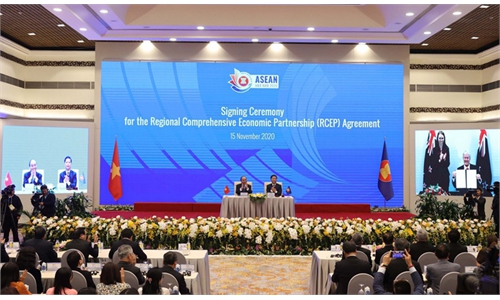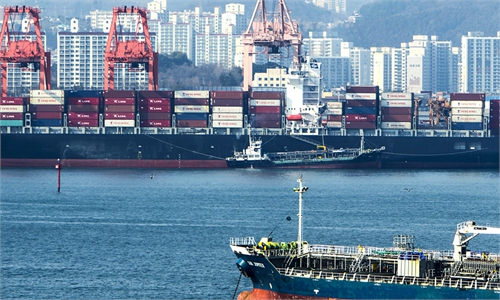COMMENTS / EXPERT ASSESSMENT
Biden’s intention to ‘write trade rules’ won’t dampen RCEP

RCEP Photo: VCG
The signing of the Regional Comprehensive Economic Partnership (RCEP) by 15 Asia-Pacific countries has sparked concerns among US-led Western world of losing dominance in global trade system. From media to politicians, there are voices suggesting to contain potential influence of the fresh trade deal.
In responding to reporters' inquiry about the RCEP, the US President-elect Joe Biden recently claimed that the US needs to seek alignment so as to "set the rules of the road instead of having China and others dictate outcomes", according to a report by American news outlet NPR.
The RCEP, after eight years of negotiation, came against the backdrop of the global economy having been hit hard by years of unilateralism and the ongoing COVID-19 pandemic which has caused massive lockdowns across the world. China, Japan, members of the Association of Southeast Asian Nations (ASEAN) and others joined hands, and signed the world's largest free trade deal covering about 30 percent of the global population and economy.
The comprehensive RCEP has brought in momentum to the integration of the world economy as well as profound significance over development of global economy and trade. Though it will bring in fiercer competition and, to some extent, reduce the US' influence in the global economy, a more opening-up Asia-Pacific region driven by the RCEP will essentially benefit the US, the world's largest economy.
For years, the US led by Trump administration has been promoting unilateralism, from launching tariff disputes with other economies to hindering operation of the World Trade Organization (WTO), from quitting Paris Climate Agreement to dropping out of the World Health Organization while the world is fighting against the pandemic.
Under the relatively more multilateralist Biden, who has stated his intention to re-enter several international organizations if he took office, it is expected that the US' unilateralism and trade protectionism promoted by the current government may be redressed gradually. With an intention to cement dominance in global trade system, Biden may choose to re-enter the Comprehensive and Progressive Agreement for Trans-Pacific Partnership (CPTPP) or promoting setup of new regional economic union through enhancing the Indo-Pacific strategy.
However, suffering the widespread coronavirus, the imminent focus of the upcoming Biden administration would be on virus containment and economic recovery. The nation has recorded over 11.4 million confirmed COVID-19 infections, topping the list of the world. It is unlikely that the new administration could take big steps on market opening-up to establish large free trade zones in short term.
And it's going to take efforts and time for the new administration to mend the world's largest economy's reputation which has been undermined by Trump's moves under unilateralism and anti-globalization.
Meanwhile, the mega RCEP marking victory of multilateralism and free trade is expected to come into effect in the near future. With great potential and rosy prospect, it will bring in growing momentum for members and facilitate reconstruction of regional value chains, which will not be dampened by potential disturbance, especially from cold-war mentality.
The article was compiled based on an interview with Li Chunding, a professor and head of the Economics and Trade Department with the College of Economics and Management at China Agricultural University. bizopinion@globaltimes.com.cn


